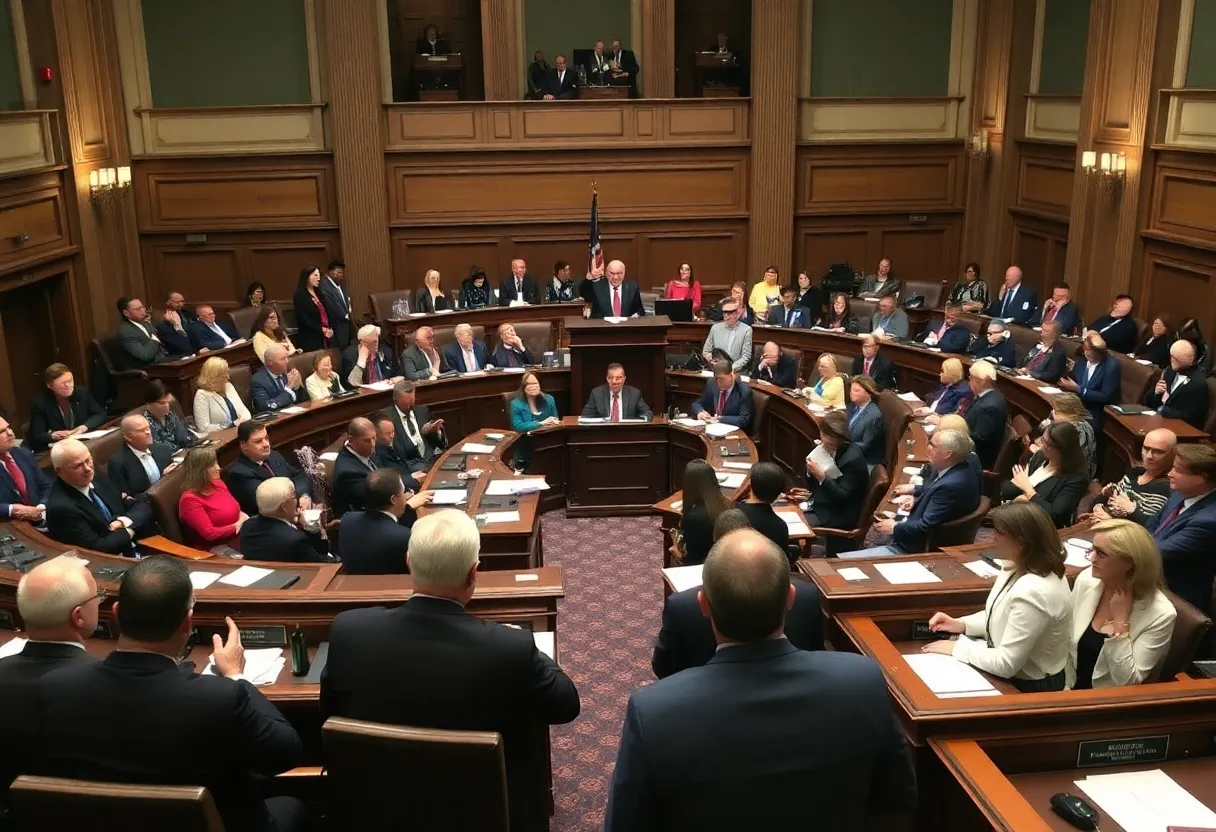

Legislators in Michigan engage in discussion over minimum wage and sick leave policies amidst upcoming legislative changes.
Want to target the right audience? Sponsor our site and choose your specific industry to connect with a relevant audience.
Prominent brand mentions across targeted, industry-focused articles
High-visibility placements that speak directly to an engaged local audience
Guaranteed coverage that maximizes exposure and reinforces your brand presence
Interested in seeing what sponsored content looks like on our platform?
May’s Roofing & Contracting
Forwal Construction
NSC Clips
Real Internet Sales
Suited
Florida4Golf
Click the button below to sponsor our articles:
Sponsor Our ArticlesMichigan lawmakers are gearing up to make critical decisions surrounding minimum wage and sick leave policies. Following a Supreme Court ruling declaring previous amendments unconstitutional, new proposals are being discussed. A compromise has been reached, including a gradual increase in minimum wage to nearly $15 per hour by 2027. However, concerns from small business owners and advocates for workers’ rights continue as the new legislation is set to impact the state’s economic landscape significantly.
In the bustling state of Michigan, elected officials are rolling up their sleeves as they face a significant decision regarding minimum wage and sick leave policies. With a swirl of opinions and nervous chatter among different industry sectors, lawmakers are in the hot seat as changes mandated by the courts are looming, set to take effect by February 21, 2025.
The seeds of this debate were sown back in 2018 when proposals emerged to raise Michigan’s minimum wage and introduce new sick leave policies. Lawmakers then made a crucial decision to adopt these proposals and steer clear of a public ballot vote. However, following the elections, the proposals were watered down, leading to discontent from various stakeholders.
Fast forward to 2024, the Michigan Supreme Court stepped in, declaring the Legislature’s process of “adopt and amend” unconstitutional. This landmark ruling has paved the way for the original proposals to take center stage once again, igniting discussions about how best to implement these changes.
As the 103rd Legislature hits the ground running, revising the upcoming rules amidst concerns from restaurant owners and employees has become a top priority. Many stakeholders have expressed their worries, fearing that the new policies could lead to significant layoffs and negatively impact Michigan’s small business economy. On the flip side, advocates for the original proposals are vocalizing the benefits, arguing that a wage increase and beneficial sick leave policies are essential for strengthening support for workers and families.
In an effort to navigate this challenging landscape, lawmakers reached a partial compromise on February 20 by passing Senate Bill 8. This legislation sets forth a gradual increase in the minimum wage, targeting a nearly $15 per hour rate by 2027, with the tipped wage holding steady at 50% by 2031. While some may argue this solution isn’t foolproof, significant voices in the Legislature believe it helps sustain jobs across local businesses.
However, the immediate effectiveness of Senate Bill 8 remains up in the air, as it requires 25 votes in the Senate for swift implementation. Compounding the situation, this bill is intricately linked to House Bill 4002, which tackles the amended paid sick leave policies. Notably, this legislation will exempt businesses with 50 or fewer employees from some sick leave requirements, while still allowing smaller businesses to manage a minimum provision for sick leave.
With the bills now signed into law by Governor Gretchen Whitmer on February 20, changes are set in motion for minimum wage and sick leave regulations. As outlined, the new laws momentarily delay paid sick leave for specific workers while also laying out a lower tipped minimum wage structure. Under the new provisions, Michigan’s tipped minimum wage is set to escalate from 38% to 50% by 2031.
Starting on February 21, the minimum wage will rise from $10.56 to $12.48—a significant step consistent with the court’s order. The state’s Department of Labor is prepared to guide businesses regarding the tipped minimum wage following the passage of the bills, addressing potential discrepancies that have emerged.
In a surprising twist, the advocacy group One Fair Wage has announced its plans to initiate a statewide referendum, challenging the new legislation. Should this move gain traction, it could lead to a requirement for voter approval before the bills can fully take effect, aiming for a daunting tally of over 223,000 signatures.
As the Michigan Restaurant and Lodging Association expresses relief over the preservation of the tipped wage structure, labor advocates have voiced concerns regarding what they view as a rollback of important worker protections. In all of this, Governor Whitmer has underlined the importance of balancing fair wages while offering support to small businesses around the state.
As the clock ticks down towards the implementation date, it will be fascinating to watch how these new minimum wage and sick leave policies unfold. With expectations for both progress and challenges, Michiganders may find themselves navigating changes that could reshape the working landscape across the state.
News Summary A couple from Michigan, Paul and Christy Akeo, faces legal troubles in Cancun…
News Summary The Michigan Department of Agriculture and Rural Development (MDARD) has announced the allocation…
News Summary Michigan is confronting a severe food crisis as food banks prepare for imminent…
News Summary Following the tragic death of 5-year-old Thomas Cooper in a hyperbaric oxygen chamber…
News Summary Michigan is experiencing the highest increase in unemployment rates in the nation, rising…
News Summary The Novi Home & Garden Show will take place from March 28 to…